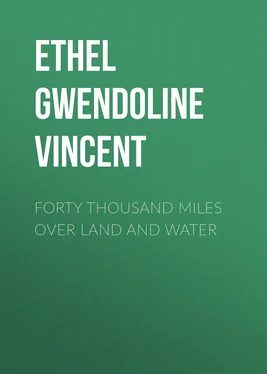Ethel Vincent - Forty Thousand Miles Over Land and Water
Здесь есть возможность читать онлайн «Ethel Vincent - Forty Thousand Miles Over Land and Water» — ознакомительный отрывок электронной книги совершенно бесплатно, а после прочтения отрывка купить полную версию. В некоторых случаях можно слушать аудио, скачать через торрент в формате fb2 и присутствует краткое содержание. Жанр: Путешествия и география, foreign_antique, foreign_prose, на английском языке. Описание произведения, (предисловие) а так же отзывы посетителей доступны на портале библиотеки ЛибКат.
- Название:Forty Thousand Miles Over Land and Water
- Автор:
- Жанр:
- Год:неизвестен
- ISBN:нет данных
- Рейтинг книги:3 / 5. Голосов: 1
-
Избранное:Добавить в избранное
- Отзывы:
-
Ваша оценка:
- 60
- 1
- 2
- 3
- 4
- 5
Forty Thousand Miles Over Land and Water: краткое содержание, описание и аннотация
Предлагаем к чтению аннотацию, описание, краткое содержание или предисловие (зависит от того, что написал сам автор книги «Forty Thousand Miles Over Land and Water»). Если вы не нашли необходимую информацию о книге — напишите в комментариях, мы постараемся отыскать её.
Forty Thousand Miles Over Land and Water — читать онлайн ознакомительный отрывок
Ниже представлен текст книги, разбитый по страницам. Система сохранения места последней прочитанной страницы, позволяет с удобством читать онлайн бесплатно книгу «Forty Thousand Miles Over Land and Water», без необходимости каждый раз заново искать на чём Вы остановились. Поставьте закладку, и сможете в любой момент перейти на страницу, на которой закончили чтение.
Интервал:
Закладка:
In the evening there is generally a "hop," or dance, advertised in one or other of the hotels, but I confess that that evening we preferred the good-humoured crowd and the fireworks in Congress Park to the hop at Congress Hall Hotel. Alternating with the fireworks were the strains of the band wafted from the pagoda in the centre of the lake, and all sat about heedless of the heavy dew lying on the grass.
We were very sorry to leave Saratoga the next morning, and undergo a very hot and dusty journey to Boston. We passed Pittsburg, as famed for its great ladies' college, as its southern namesake is for its iron-works, and late in the afternoon reached Boston, Massachusetts. A red and yellow coach, suspended by straps to C springs, such as were in use in the last century, conveyed us to the Hotel Vendôme.
I think Boston the most charming of all the American towns. The broad sweeping avenues are bordered by houses of red sandstone, a soft mellow colour, that contrasts well with the green avenues of trees and grass borders. Commonwealth Avenue is the finest of these continuous "parks," and is a mile and a half long. The Common, with its avenues of fine elm-trees, forms a large open space in the middle of the town, and separated only by a road are the public gardens. A bronze statue of Washington rises in the middle, surrounded by a brilliant flower-bed, the colours blending in carpet-gardening to form a Moorish inscription, which translated means "God is all-powerful," a very fitting motto for the great hero. The gilded dome of the Massachusetts State House dominates them from the eminence of Beacon Hill; but far more interesting than this new erection is the venerable time-worn building of the "Old State House," where some of the most stirring scenes of the Revolution were enacted. From this balcony the Declaration of Independence was read to the people. Our troops occupied the buildings during the Stamp Riots, but at the close of the war Washington stood on its steps the chosen hero of the exultant populace. So many of the buildings are closely associated with humiliating remembrances of that fatal epoch in British history when these fair provinces, owing to the lack of foresight and imbecility of her leaders, were for ever lost to England.
There is the old Scotch church, so famous as the political meeting-place of the Boston Tea Party; Tancred Hall, the "Cradle of Liberty," nurtured by the patriotic orations of Adams, Everett, and above all of Daniel Webster; the harbour, with its numerous shipping, where was lighted the first straw of that great conflagration of the "Rebellion," by the throwing overboard of those few chests of tea.
The city is rich in churches, there being no less than 150 belonging to all denominations, who raise their spires heavenwards within its precincts. But Trinity Church surpasses all in beauty and design. It is built of granite and freestone in the form of a Latin cross, in Romanesque style. The stained glass is rich in harmonious colouring, depicting no subject, but blending into a mystery of blue, orange, and purple. Some lancet windows, filled with iridescent glass of pale blue, gave the appearance of shining steel.
We started early on that quiet Sunday morning for a drive to Cambridge in one of the "Herdic Hansoms." These curious vehicles with their jolting motion can only be described as covered two wheeled carts. We passed the green hill on which stands Bunker's Hill Monument. It is inexpressibly grand in its massive simplicity, being only huge blocks of granite narrowing in such imperceptible proportion to the summit, that the pyramidal ending seems in perfect accord with the broad base. No railing surrounds it. There is no decoration or inscription: it stands alone in its majesty, sufficiently raised to be a landmark to the whole town. Our road led through Charlestown, where the seafaring population chiefly live close to the harbour. A long, straight, dusty road, under a blazing sun for three miles, brought us to Cambridge, the immediate approach to which is through stately avenues of elm-trees.
The colleges of Harvard University are clustered together, forming an irregular quadrangle. There was a delightfully quiet and studious look about the dull red-brick buildings, low latticed windows, and ivy-covered walls,—a look of antiquity unusual to America. In this comparatively newly-risen continent so much is thought of age, that Harvard College, the oldest of the fifteen of which the University consists, is prized most highly for its foundation dating from 1636.
Chief amongst the colleges for beauty is the Gothic tower of Memorial Hall, erected by the alumni in memory of the students who perished in the War of Secession. It contains the great dining-hall with carved screens and galleries, busts and portraits of the founders of the college, and has stained-glass windows bearing the college and State arms. A theatre, library, museum, scientific school, and chapel are in different parts of the irregularly laid-out square, which is sacred to the University buildings.
It was vacation time, and the place was utterly deserted, save by a few straggling church-goers, their footsteps resounding on the narrow paved walk, and lingering amongst the tenantless walls. It must be a different scene in term, when 1300 students and forty-seven professors gather under the classic shades of a university already numbering among its former students such men as John Adams the second President of the United States, Edward Everett, Ralph Waldo Emerson, Oliver Wendell Holmes, John Lathrop Motley, J. Russell Lowell, and Wendell Phillips. The University course extends over four years. It may be interesting to know, in face of the recent agitation at our own universities on the subject, that women are not as yet admitted to the University lectures, though allowed to matriculate and pass the different examinations.
Quite near the University is a battered elm-tree, whose shattered branches are sustained by iron stanchions, and which marks the place where General Washington took command of the rebellious colonists. Further on we passed a plain, square, wooden house, with pointed roof, and a small garden, surrounded by a high laurel hedge, a gravel path, and little white gate leading to the verandah and entrance. There was nothing particular to mark a house, homely enough in its exterior. But yet it was here that in 1775 Washington established his headquarters, when it was the scene of many warlike preparations and much enthusiasm. Later it has been hallowed by the quiet presence of the great poet Longfellow.
"The old house by the Lindens
Stood silent in the shade,
And on the gravell'd pathway
The light and shadow play'd."
And it was in this quiet retreat that he passed away in 1882.
We followed the winding road, almost an avenue of willow-trees, to Mount Auburn Cemetery, and with great difficulty found his last resting-place. We were terribly disillusioned. Not a garden of flowers, tended by loving hands; not a simple marble monument with short inscription, prompted by a knowledge of the gentle, retiring, nature; but we found a great, ugly block of sandstone, a huge sarcophagus, with a name and date on one side, and an ingenious pattern on the other, taking X as a centre letter, and forming a senseless device, and utterly inappropriate to the memory of the great poet.
No more beautiful garden than this cemetery could be conceived: grassy slopes, planted with waving palms and the choicest plants; bright flower-beds interspersed among the white marble crosses and memorials of the dead; an air of quiet beauty and repose, mingling with the many signs of respectful care on the different graves, such as bunches of newly-cut flowers. Those who have served their country had a miniature flag of the stars and stripes waving over their heads. The mortuary chapel stands on the high ground, and opposite to it there is a magnificent marble sphinx with this soul-stirring inscription,—
Читать дальшеИнтервал:
Закладка:
Похожие книги на «Forty Thousand Miles Over Land and Water»
Представляем Вашему вниманию похожие книги на «Forty Thousand Miles Over Land and Water» списком для выбора. Мы отобрали схожую по названию и смыслу литературу в надежде предоставить читателям больше вариантов отыскать новые, интересные, ещё непрочитанные произведения.
Обсуждение, отзывы о книге «Forty Thousand Miles Over Land and Water» и просто собственные мнения читателей. Оставьте ваши комментарии, напишите, что Вы думаете о произведении, его смысле или главных героях. Укажите что конкретно понравилось, а что нет, и почему Вы так считаете.












